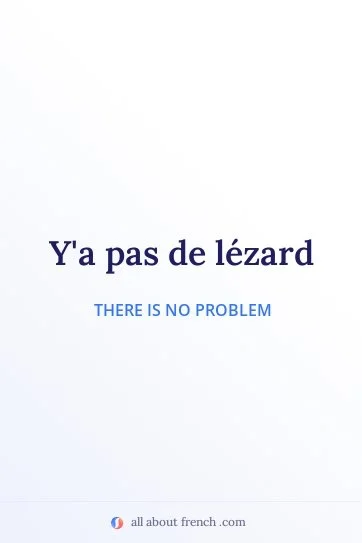
Get ready to find out everything you ever wanted to know about the funny French expression "Y'a pas de lézard". This include a full definition of what it is and how you can use it in a dialogue with an audio example. And that's not all, we also added useful informations like slow pronunciation audio, synonyms, dialogue example and more!
Translation : There is no problem
Literal meaning : There is no lizard
Register : Informal - Funny
Slow
Normal
IPA : / ia pa də lezaʁ /

It literally means:
It's an expression that we use to reassure someone after something happened. Typically: to minimize an issue, clearing up a misunderstanding, or to reassure about our wellness after an unfortunate event. And it's basically the shortened version of "Il n'y a pas de lézard"
But what's the link with a lizard?
During the recording process, musicians often face a hiss/whistle which ruins the record, and they call it "lizard". So by extension "Y'a pas de lézard" (There is no lizard) became a way to say: "There is no problem".
Do not use this expression in a formal context. Ex: your boss tells you to work on Sunday. You can answer: "Oui, pas de soucis, je serai là." (Yes, no problem, I will be there). But avoid using "Y'a pas de lézard" in this situation...
Scenario 2: you are falling off stairs and then a friend comes to ask you if you are ok. You might say: "Y'a pas de lézard, je vais bien." (There is no problem, I'm fine)
There is an infinite number of synonyms, here are the most used ones:
Neutral context
Informal context
Dialogue
Tu viens au cinéma avec nous ?
Are you coming to the cinema with us?
Je ne peux pas, j'ai du pain sur la planche
I can't, I have bread on the board
Y'a pas de lézard, je comprends
There is no lizard*, I understand
Learn French with Audio Stories
Learn French the easy way with our French - English
parallel texts with slow French audio
 Start Learning
Start Learning 